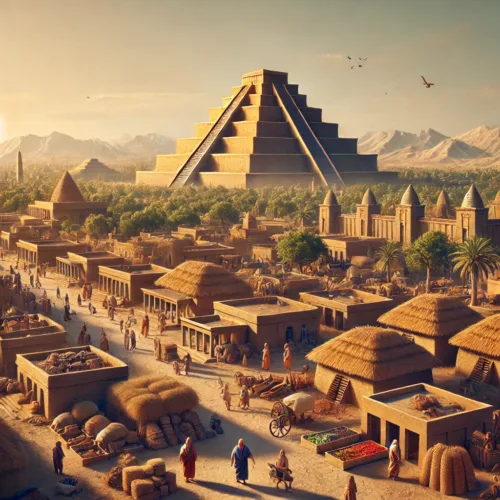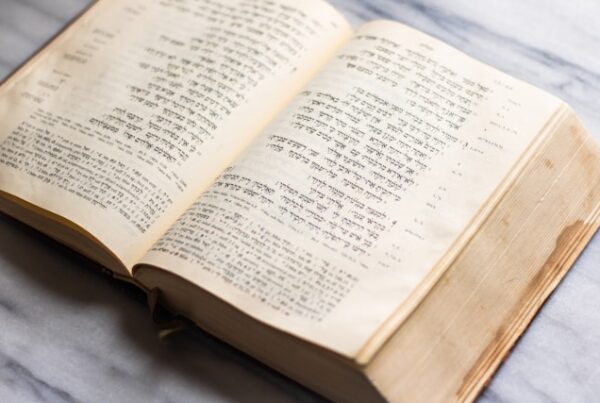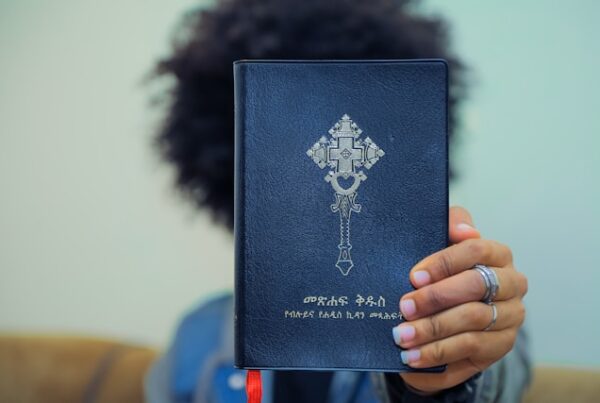The Bible can be an intimidating book to begin reading at first. An ancient collection of books with varying genres, it spans thousands of years and contains varying aims as a sacred text. Knowing what to read begins with knowing about the overall story of how the Bible fits together.
The Bible comprises 66 books, 39 in the Old Testament and 27 in the New Testament. Each book is a varied collection of experiences of humanity’s encounter with God. Some of it records who God revealed himself to be and what people did as they worked out life in light of their faith.
The Bible offers wisdom, insight, guidance, cultural experience, history, revelation and spiritual nourishment. It also tells the bigger story of God’s creation and humanity’s place.
So, should you begin at the beginning and work your way through? It might surprise you that the book is not written chronologically but in collections of topical categories. For instance, the first five books of the Bible are Genesis, Exodus, Leviticus, Numbers and Deuteronomy. These are known as ‘The Law’, or ‘The Pentateuch’ meaning 5 law books or ‘The Torah’, Hebrew for ‘Law’ or ‘Instruction’.
The oldest, and therefore first written, book in the Bible is the Book of Job, which is 18 books into the Bible. Galatians is the earliest book in the New Testament, even though the Gospels appear before it.
So, where to begin?
First, let’s look at the Bible’s make-up, then discuss the overall big picture, and that will help us decide the best place to begin reading the Bible for the first time.
How Is The Bible Ordered?
The Bible is broadly organised into topical genres within two large bodies of work known as the Testaments. The Old Testament comprises the books of Law, Prophets, Wisdom, Poetry, Apocalyptic, and NarrativeThe New Testament consists of the Gospels, Acts of the Apostles, Letters (known as Epistles), and further apocalyptic writings.
Consequently, there is no correct order to read the Bible. I would recommend beginning with the Gospels as this is the heart of God’s bigger story. First, look at the tables below to get an idea of the big picture; after that, I’ll guide you on where to start and what to expect.
Below is a handy table to help you see how it is broken down across the Bible. You can then see how it fits together and what genre each book roughly fits into, guiding you in what to expect from reading each book. As you can see, it is not a simple thing to understand. And yet, if you jump further down in this article, there are some straightforward things you can do to begin understanding the Bible for yourself.
The Order Of The Old Testament
Pentateuch (Torah):
| # | Book | Theme | Approximate Date of Authorship |
|---|---|---|---|
| 1 | Genesis | Creation, Patriarchs, Origins | 10th century BCE |
| 2 | Exodus | Liberation, Covenant, Law | 10th century BCE |
| 3 | Leviticus | Holy Living, Rituals, Worship | 06th century BCE |
| 4 | Numbers | Wilderness Journey, Laws, Census | 05th century BCE |
| 5 | Deuteronomy | Covenant Renewal, Final Instructions | 05th century BCE |
Historical Books:
| # | Book | Theme | Approximate Date of Authorship |
|---|---|---|---|
| 6 | Joshua | Conquest of Canaan | 07th century BCE |
| 7 | Judges | Leadership, Cycles of Apostasy | 10th century BCE |
| 8 | Ruth | Loyalty, Redemption | 10th century BCE |
| 9 | 1 Samuel | Samuel, Saul, David | 10th century BCE |
| 10 | 2 Samuel | Reign of David | 10th century BCE |
| 11 | 1 Kings | Solomon, Division of the Kingdom | 6th-5th century BCE |
| 12 | 2 Kings | Israel, Judah’s Kings | 6th-5th century BCE |
| 13 | 1 Chronicles | Genealogies, David’s Reign | 4th century BCE |
| 14 | 2 Chronicles | Judah’s Kings, Exile, Return | 4th century BCE |
| 15 | Ezra | Return from Exile, Rebuilding | 5th-4th century BCE |
| 16 | Nehemiah | Rebuilding Jerusalem’s Walls | 5th-4th century BCE |
| 17 | Esther | Persian Queen, Deliverance | 5th-4th century BCE |
Wisdom Literature:
| # | Book | Theme | Approximate Date of Authorship |
|---|---|---|---|
| 18 | Job | Suffering, God’s Sovereignty | 10th century BCE |
| 19 | Psalms | Poetry, Worship, Praise | 10th-5th century BCE |
| 20 | Proverbs | Wisdom, Practical Advice | 10th-6th century BCE |
| 21 | Ecclesiastes | Vanity of Life, Wisdom Reflections | 3rd century BCE |
| 22 | Song of Solomon | Love Poems | 10th-6th century BCE |
Major Prophets:
| # | Book | Theme | Approximate Date of Authorship |
|---|---|---|---|
| 23 | Isaiah | Prophecy, Messiah | 8th-6th century BCE |
| 24 | Jeremiah | Prophecy, Judah’s Exile | 7th-6th century BCE |
| 25 | Lamentations | Mourning, Jerusalem’s Destruction | 6th century BCE |
| 26 | Ezekiel | Prophecy, Visionary Experiences | 6th-5th century BCE |
| 27 | Daniel | Prophecy, Exile, Apocalyptic Visions | 6th-2nd century BCE |
Minor Prophets:
| # | Book | Theme | Approximate Date of Authorship |
|---|---|---|---|
| 28 | Hosea | Prophecy, Israel’s Unfaithfulness | 8th century BCE |
| 29 | Joel | Prophecy, Day of the Lord | 8th-5th century BCE |
| 30 | Amos | Prophecy, Social Justice | 8th century BCE |
| 31 | Obadiah | Prophecy, Judgment on Edom | 6th-5th century BCE |
| 32 | Jonah | Prophecy, God’s Mercy to Nineveh | 8th century BCE |
| 33 | Micah | Prophecy, Social Justice | 8th century BCE |
| 34 | Nahum | Prophecy, Judgment on Nineveh | 7th century BCE |
| 35 | Habakkuk | Prophecy, Questions to God | 7th century BCE |
| 36 | Zephaniah | Prophecy, Day of the Lord | 7th century BCE |
| 37 | Haggai | Prophecy, Temple Reconstruction | 6th century BCE |
| 38 | Zechariah | Prophecy, Messianic Visions | 6th-5th century BCE |
| 39 | Malachi | Prophecy, Covenant Renewal | 5th century BCE |
The Order Of The New Testament
Gospels:
| # | Book | Theme | Approximate Date of Authorship |
|---|---|---|---|
| 40 | Matthew | Gospel, Life of Jesus | 1st century CE |
| 41 | Mark | Gospel, Jesus’ Ministry | 1st century CE |
| 42 | Luke | Gospel, Jesus’ Compassion | 1st century CE |
| 43 | John | Gospel, Jesus’ Divinity | 1st century CE |
Historical Book:
| # | Book | Theme | Approximate Date of Authorship |
|---|---|---|---|
| 44 | Acts | Early Church History | 1st century CE |
Pauline Epistles:
| # | Book | Theme | Approximate Date of Authorship |
|---|---|---|---|
| 45 | Romans | Epistle, Justification by Faith | 56-58 CE |
| 46 | 1 Corinthians | Epistle, Church Correction | 55 CE |
| 47 | 2 Corinthians | Epistle, Paul’s Defense | 55-56 CE |
| 48 | Galatians | Epistle, Justification by Faith | 49-55 CE |
| 49 | Ephesians | Epistle, Unity in Christ | 60-62 CE |
| 50 | Philippians | Epistle, Joy in Christ | 60-62 CE |
| 51 | Colossians | Epistle, Supremacy of Christ | 60-62 CE |
| 52 | 1 Thessalonians | Epistle, Encouragement | 51 CE |
| 53 | 2 Thessalonians | Epistle, Second Coming of Christ | 51-52 CE |
| 54 | 1 Timothy | Epistle, Pastoral Advice | 62-64 CE |
| 55 | 2 Timothy | Epistle, Encouragement | 64 CE |
| 56 | Titus | Epistle, Instructions for Leaders | 62-64 CE |
| 57 | Philemon | Epistle, Paul’s Appeal for Onesimus | 60-62 CE |
General Epistles:
| # | Book | Theme | Approximate Date of Authorship |
|---|---|---|---|
| 58 | Hebrews | Epistle, Christ’s Superiority | 60-70 CE |
| 59 | James | Epistle, Faith and Works | 45-50 CE |
| 60 | 1 Peter | Epistle, Perseverance in Suffering | 60-64 CE |
| 61 | 2 Peter | Epistle, Warning Against Falsehood | 60-68 CE |
| 62 | 1 John | Epistle, Love and Assurance | 85-95 CE |
| 63 | 2 John | Epistle, Warning Against Deceivers | 85-95 CE |
| 64 | 3 John | Epistle, Commendation and Warning | 85-95 CE |
| 65 | Jude | Epistle, Warning Against Apostasy | 70-90 CE |
Apocalyptic Book:
| # | Book | Theme | Approximate Date of Authorship |
|---|---|---|---|
| 66 | Revelation | Apocalyptic, End Times Visions | 90-95 CE |
What Is The Bible About?
Knowing something about how each genre fits into the Bible will help you better understand your faith and the God of the bible.
The Bible is the collective writings of God’s love for humanity, the problem of sin, redemption of humanity’s failing and restoration to a close relationship with God. It captures the joy and pain of human experience in love, loss, longing, wisdom, foolishness and forgiveness.
The Law
Genesis shows humanity’s state of being and God’s relationship to us. The books of law establish God’s standard for the people he chose first to reveal himself to ⎯the Hebrews.
History
The historical books capture the times when God’s people continually fell short of his perfect standard, and they covered their struggle for survival as they repeatedly turned away and back to God across the generations.
Wisdom & Poetry
The Wisdom Literature brings powerful insight into God’s nature and how people understood Him. They reveal truth, struggle, joy, and sorrow as the writers experience all levels of human emotion. This is then captured in praise, worship and reflection on meaning and purpose. These books are highly poetic and extenssential.
Major & Minor Prophets
The prophets are God’s warnings, promises and explanations of future events as God’s people are urged to keep in line with His standards. The foretell and foreshadow what will happen in the New Testament and beyond.
The Gospels
There are four Gospels, each showing you a perspective on those who were with Jesus and captured much of the ministry within his life. They largely revered, and accurately so, as eyewitness accounts of the life of Jesus.
The Book of Acts
Also known as ‘The Acts of The Apostles’, Acts chronicles the events in the life of the apostles of Jesus after he had died and ascended into heaven. They are filled with stories of the early church and how it began to develop. They contain miracles, historical occurrences and insights into early church life.
Epistles
The largest section of the New Testament, the various letters known as the epistles, were written to the early church in varying locations to offer instruction, guidance and theology to early Christians. They contain great value in understanding cultural challenges as the church grew in the melting pot of Greek and Roman societies. Many life issues are addressed, and the letters still hold wisdom for many of us today.
Apocalyptic
Along with Daniel from the Old Testament, the New Testament book of Revelation is to be understood as a narrative depicting the completion of God’s plan as the world is restored from sin and everything is made right. There are many ways to understand these highly. descriptive and sometimes figurative writings and arguably should be the last books to tackle.
What Should I Read in The Bible First?
The Gospel of Mark is the best place to begin. The Gospels cover the central purpose of the Bible and how Jesus is most significant in the Bible. Mark is the shortest Gospel, and it was written to people who did not quickly grasp religious subtleties but were everyday people.
The Psalms are also a great place to begin, as they describe the character of God and how He is often worshipped through song and poetry. Psalms are often read interchangeably with Proverbs for a balance of life wisdom as well as poetic reflections.
After that, I would encourage people to read Genesis to get an understanding of some of the bigger themes at play. This will help make sense of why Jesus needed to come to humanity, as depicted in Mark.
After those three books, it’s time to explore a reading plan and brave other parts of the Bible while being mindful of the cultural challenges of understanding texts that are thousands of years old.
Begin reading today, and let us know how you get on.
Leave a comment and share your first experience of reading the Bible.









